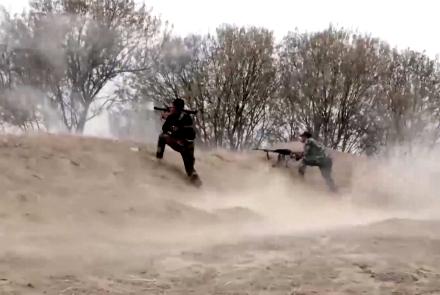Reactions pour in to the Taliban announcing the beginning of their so-called spring offensive on Friday, even as new fresh waves of hopes emerge in the country following recent diplomatic efforts in the national and international levels to bring the ongoing war to an end.
Gulbuddin Hekmatyar, the reconciled leader of Hizb-e-Islami, said both the Afghan government and the Taliban should focus on bringing peace rather than insisting on military approach.
“The announcement of war is against the announcement of war of other side. This is not one-sided. We cannot blame one party,” said Hekmatyar.
Reports indicate that fighting has intensified over the past 24 hours in at least ten provinces of the country and threats are also on the rise in the remaining 25 provinces.
In a new wave of clashes, Shafi Arabzada, an Army soldier in Kunduz, lost his life after Taliban attacked their check posts on the outskirts of Kunduz city.
His family said they expected the war to deescalate this summer, but their hopes are now declining after the Afghan government and the Taliban announced their fresh military campaign.
Arabzada celebrated his engagement five months ago.
“When a check point is sieged, they ask for help until they die, but these gentlemen are still busy in making their operational plan,” said Arabzada’s friend.
The Ministry of Defense meanwhile, confirmed that fighting has intensified in various regions of the country, including Kunduz, Baghlan, Ghazni, Zabul, Maidan Wardak, Badakhshan and Nangarhar, but the Taliban has said that clashes are ongoing in 25 provinces.
“There is a need for bigger decision for Baghlan, challenge will grip entire north if the province goes fragile,” said Mohammad Hanif Kahgadai, member of Baghlan Provincial Council.
“The government forces launched special operations in various parts of the country in the past 24 hours. Massive casualties has been inflicted to the enemy during these operations,” said Zubair Arif, a spokesman for the Defense Ministry.
On April 9, the Afghan government announced that President Ashraf Ghani has approved the security plan for the current solar year as conflicts are intensifying between security forces and Taliban in different parts of the country.
The National Security Council said in a statement that the plan, named Khalid Security Plan, is aimed at boosting security across the country particularly the security of urban areas and highways.
As well as, the plan is aimed at suppressing the enemy, recognizing vulnerable areas in terms of threats by militants, ensuring the safety of upcoming presidential elections, preventing civilian casualties and better deploying of forces.
Military experts said that Taliban’s announcement of spring offensive has massively affected "their credibility".
“This has massively harmed the Taliban’s credibility and it is a big political loss for them,” said Assadullah Walwaji, referring to the Taliban’s spring offensive.
The Taliban has said that they announced their spring offensive Al-Fatha in response to government’s security plan.
Taliban’s Operation Fatha -- which means “victory” in Arabic -- will be conducted across Afghanistan with the aim of “eradicating occupation” and “cleansing our Muslim homeland from invasion and corruption”, Taliban said in a statement on April 12.
The annual spring offensive traditionally marks the start of the so-called fighting season, though the announcement is largely symbolic as in recent winters the Taliban has continued fighting Afghan and US forces.



Comment this post